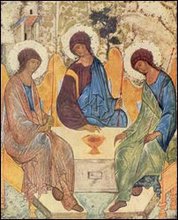Ephesians 4:1-6
As a prisoner for the Lord, then, I urge you to live a life worthy of the calling you have received. Be completely humble and gentle; be patient, bearing with one another in love. Make every effort to keep the unity of the Spirit through the bond of peace. There is one body and one Spirit—just as you were called to one hope when you were called—one Lord, one faith, one baptism; one God and Father of all, who is over all and through all and in all.
Questions:
- What in this text strikes you as remarkable?
- Who is Paul speaking to? [This is crucial for our understanding.]
- What is his main point?
- What do you think it means to "live a life worthy of the calling"?
- How we develop and maintain humility?
- What does it mean to "bear with one another in love"?
- What effort can you make to "keep the unity of the Spirit"?
- Think about each of the 7 "ones," why are these 7 so important?
- How do these 7 "ones" impact unity?
- How can we use this passage to create greater unity among the generations?
- How does passage fit with this statement? We are baptized believers participating in the life of God for the sake of others.
What else is on your mind this week?

